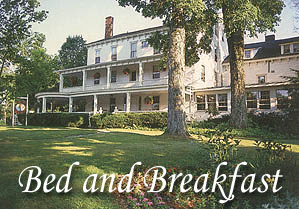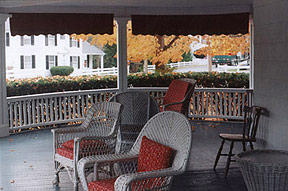 |
 |
 |
|
|||
 Photo courtesy of the Egremont Inn
Bed
& Breakfast By Trish Anderton, 9/13/2002 You know the dream...It comes when you're tapping away in your cubicle at work, or when you're sitting in rush-hour traffic: Why not buy an old house in the country, you think, with a big porch and a view, fill the rooms with comfy, old furniture, and rent them out, keep the fireplace crackling in the winter, and bake blueberry muffins every morning -- blueberry muffins or peach, whatever's in season....and definitely organic. There's an old Irish saying: "In dreams, begin responsibilities." In this case, that means my wake-up call at the Egremont Inn comes way before I'm ready. It's Saturday, my first day here, and co-owner Steve Waller is already in the kitchen making multiple pots of coffee as his employees come in. Steve (greeting employees): Good morning. How are you? Fine, how are you? I'm good. Steve is alarmingly cheerful, considering he was up until 1 a.m. I'm pretty grumpy, and I went to bed early. While I rub my eyes, he's getting ready for the breakfast rush. Steve: They don't make reservations. They just walk in, so you can get 40 people in the first 10 minutes, 40 people in the last 10, or perfectly distributed -- which never happens. Steve is the public face of the Egremont Inn. Dressed neatly, but casually, in a business shirt and jeans, his thinning black hair brushed back from his face, he floats around getting people what they want: like a table on the porch, or golf on TV. And, he answers the frequent, insistent ringing of the phone. Steve: Morning, Egremont Inn, can I help you? Hello, how are you?
The first floor of the Egremont consists of the restaurant, a tavern, and several common rooms to lounge around in. As I'm chasing Steve with my microphone, his wife Karen walks into the tavern. She promptly announces she has a headache and a stiff neck. She'd scream, but if she screams too loud, she'll fall down. Instead, Karen plunks down in a chair and stares morosely at the tablecloth. Karen: You just get tired. You get burnt out and bloody tired. Karen does look a little worn and pale. At 59, she's 8 years older than Steve. She draws her long hair back into a loose ponytail, and favors big, loose, comfortable shirts. She met Steve two decades ago in the computer industry. Her specialty? "Reorganizing" faltering companies. It's not so hard to imagine Karen as a high-tech hatchet woman. She has a magnetic personality, but can seem abrasive -- angry one minute, laughing the next, and always overflowing with opinions. Steve and Karen expected the inn to be hard work; they didn't have the dream of a bucolic life. Still, Steve says, it has been even more demanding than he expected. Steve: If you're really serious, you do it and you don't do anything else: you don't see anyone on the weekends, you don't travel. This is an all-consuming business. It's our livelihood and our life. After breakfast, I follow Karen out to do the shopping. It's clear Karen is the analytical genius behind the Egremont Inn. At the grocery store, she subjects every fruit and vegetable to a withering gaze. "See those tomatoes?" she whispers. Indelible. A small web of mold on a container of raspberries outrages her. Karen: See what you pay for? I'm not buying that. You wouldn't eat it. Some under-ripe nectarines meet her approval, though she thrusts one at my microphone. Karen: Put that damn thing down and feel this. That has no bruises, but it's still hard. That's three days. Looks to me like white nectarine tart on Wednesday and Thursday. Karen's take-no-prisoner style is part choice and part necessity. The inn relies on wealthy customers from Boston and New York. Even though the Egremont is out in the country, it's competing with the best restaurants in Manhattan. After the supermarket, we go to two farmstands: one for tomatoes, one for blueberries. Driving home, Karen shakes her head at the part-time businesses and rundown houses in this rural area. Karen: People never get out of the area. It breaks your heart. They have no concept of the economy, no concept of globalization. I can't understand a view of life that makes you fearful of learning. As we reach the inn, it occurs to me that Steve and Karen aren't living some escapist dream, carving out a country retreat for themselves. Instead, they've established a little urban outpost of frantic living and city values here in the mountains. Steve and Karen work 7 days a week. The phone at the inn rings next to their bed in the owner's quarters, and calls at 3 a.m. are not unheard of. The work is very hands-on. Saturday night, 18 people cancel their dinner reservations at the last minute. Steve spends the evening juggling tables, trying to squeeze in more walk-ins among the guests to make up the difference. Karen's role is in the kitchen, where she makes sure orders get in to the chefs, and food goes out to the tables. On order: halibut, angus medium rare, upfront greens and a tomato. Everybody stays up late again. There's a lingering sense of disappointment about the cancellations. Of course, the frustration never reaches the guests. Everyone at the tables seems to be having a grand time. Sitting down to do the totals at the end of the evening, Karen vents her pent-up annoyance at a bill from table one. Karen: There are some people who should not be allowed to go out. Look at that tip. These were the people at table one: 'Hurry and take my order, hurry and take my order.' They left $20 bucks on a $188 there, doll. But as she sips a glass of wine and jokes with the waitresses, her mood improves. Looking around, I find Steve standing at the bar talking animatedly with some customers. Whatever the frustrations, there is some pleasure in owning the place others come to have a good time. Relationships at the Egremont are intense. The next day, Carmen the waitress has an asthma attack before her shift. Carmen's petite and blond with short boy-cut hair. When I walk into the tavern, she's sitting at a table while Karen berates her for not getting on her ex-husband's health insurance, for eating junk food, smoking -- even for her asthma. Karen: She's a pain in the ass. She does this to get attention. The intensity even carries over to the inn's large staff of stuffed animals. Every guest room has its own fuzzy mascot. The tavern is presided over by Wallace the Penguin, who sits on the corner of the bar wearing sunglasses. Karen doesn't like him to get smudgy. Karen: He has a habit: he lets people rub his belly and he gets dirty. He has to have a bath. Karen and the waitresses fuss over how Wallace hates to take baths, how angry his little eyes look, and so forth. Wallace, of course, can't complain, or make bizarre demands, or leave a bad tip. He's the perfect guest. Carol: You bring your personality to innkeeping. Carol Jones is as close to Steve and Karen have to a second-in-command. She comes in on weekdays to handle the front desk. Carol: I've worked in retail and in a retail business. If someone doesn't want what you're selling, you just move on, it's no big deal. But in an inn environment, it's almost like your home. It's not -- you keep telling yourself -- it's not, but it's almost like your home, and when people aren't happy with it, you can't help taking it personally. That, Carol says, is probably why the staff vents so much about bad customers. That's why they love the good ones. Maybe that's why Karen takes care of her staff, why she tells Carmen to go lie down until she feels better, why, the next day, she praises a teenage busgirl in front of her mother until the girl blushes with embarrassment and pride. Monday, the inn starts to empty out. That means Steve can get into room 6 to install a new showerhead. Steve: C'mon, don't make this difficult. Hospitality businesses operate on a thin margin. At the Egremont, the rooms are the profitable side of the business: more rooms equals more money, as long as you don't spend too much on upkeep. That's why Steve does all the maintenance. Room 6 is right above the kitchen, and when the dishwasher goes on or off, it causes wild variations in the water temperature. Steve: "'Screw the female end onto the shower arm until tight. No wrench neessary.' Ok. I believe you -- until it leaks. The new showerhead is supposed to shut off when the water gets too hot. Steve: So, lets turn the water on and see what happens. Nope, no leaking. (water stops). Holy sh-t.
To Steve's surprise, it actually works. Temperamental plumbing is just one aspect of owning an 18th-century building. Over the years, Steve has quietly carried out a massive overhaul of the rooms. But out of the 20 rooms at the inn, 19 need some kind of work at the moment. Steve and Karen could spend the rest of their lives on this place, but Karen says they do think about selling. Karen: Bad time to sell now. Maybe a couple of years, maybe three, maybe never; maybe one of the kids will take it over, as if I raised kids that dumb. It's clear there's a lot of things Steve and Karen love about running the inn, like working together and working for themselves. Or, the fierce pride they take in providing their employees with benefits and paid vacations, a rarity in this business. Like, the joy they feel as former computer geeks tinkering with the systems, getting the inn to work exactly right. Or, like the thank-you note one couple wrote at the end of this weekend, telling Steve how comfortable they were. Steve: It's the single, best word, that when they stay here, they're comfortable. And, that is a very rare thing in this business. You've been a lot of places where you don't get that feeling -- and, you can't write a manual to say how to do it. By the end of day four, I'm almost ready to sign up to be an innkeeper. I've been completely sucked into the Egremont's workaholic haze. As I head home, I feel guilty for all the weekends I've taken off this year. I can't believe I used to complain about 60-hour weeks. Then, 2hours into my drive, I begin to relax. I remember that I like my friends, and hiking, and ballgames at Fenway Park. I don't have to give up all these things and go run a B&B. I heave a sigh of relief. Next time I need to escape from work, I think I'll daydream about becoming an accountant. I'd have a cute little adding machine and a big curly-maple desk with an antique lamp, and a pocket protector for every suit! Sure, April would be a cruel, cruel month, but that's better than a whole year. I think I'll just swing by an office supply store on my way home. For The Savvy Traveler, I'm Trish Anderton.
|
|
Search
Savvy Traveler
|
|

